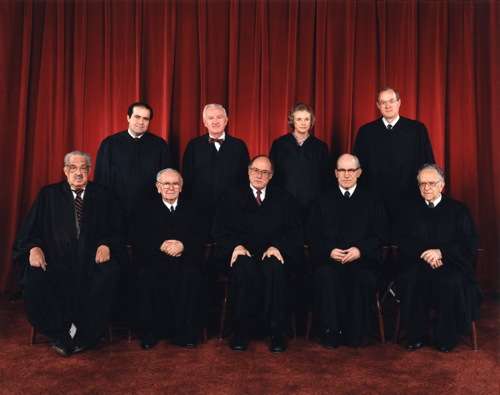The Volokh Conspiracy
Mostly law professors | Sometimes contrarian | Often libertarian | Always independent
Today in Supreme Court History: September 6, 1983
9/6/1983: The City of Richmond solicited bids for installing plumbing fixtures at the city jail. The J.A. Croson Company's bid was denied because it did not meet the "set-aside requirement" for minority contractors. The Supreme Court declared this decision unconstitutional in City of Richmond v. J.A. Croson Co. (1989).

Editor's Note: We invite comments and request that they be civil and on-topic. We do not moderate or assume any responsibility for comments, which are owned by the readers who post them. Comments do not represent the views of Reason.com or Reason Foundation. We reserve the right to delete any comment for any reason at any time. Comments may only be edited within 5 minutes of posting. Report abuses.
Please to post comments


Shamburger v. Cockrell, 536 U.S. 986 (decided September 6, 2002): denied stay of execution and also denied cert. Stevens and Ginsburg would have granted the stay (probably because both had come to believe that the death penalty, as practiced, is always a violation of Due Process). Shamberger was executed by lethal injection five days later. A student at Texas A & M, he had shot another A & M student during an off-campus burglary. This was one of many burglaries he had committed. The gun was a 9mm pistol he had bought with a stolen credit card he had already stolen from the victim (whom he had been stalking). He tied the victim up and gagged her with duct tape, and then shot her when he heard her roommate coming home. He confessed to the crime within hours after the attack and apologized to the family over and over, including on the day of execution. On appeal he had contested only the sentence (death as opposed to life imprisonment).
City of Richmond v. J.A. Croson Co. (1989)
Facts of the case
In 1983, the City Council of Richmond, Virginia adopted regulations that required companies awarded city construction contracts to subcontract 30 percent of their business to minority business enterprises. The J.A. Croson Company, which lost its contract because of the 30 percent set-aside, brought suit against the city.
Question
Did the Richmond law violate the Equal Protection Clause of the Fourteenth Amendment?
Conclusion
In a 6-to-3 decision, the Court held that "generalized assertions" of past racial discrimination could not justify "rigid" racial quotas for the awarding of public contracts. Justice O'Connor's opinion noted that the 30 percent quota could not be tied to "any injury suffered by anyone," and was an impermissible employment of a suspect classification. O'Connor further held that allowing claims of past discrimination to serve as the basis for racial quotas would actually subvert constitutional values: "The dream of a Nation of equal citizens in a society where race is irrelevant to personal opportunity and achievement would be lost in a mosaic of shifting preferences based on inherently unmeasurable claims of past wrongs." (oyez)
FYI, there are still Set-Asides and Special Interest Groups.
The federal government establishes formal goals to ensure small businesses get their fair share of work. Every federal government purchase between $10,000 and $250,000 is automatically set aside for small businesses, as long as there are at least two companies that can provide the product or service at a fair and reasonable price.
Women-Owned Small Businesses (WOSB)
Small Disadvantaged Businesses and 8(a) Small Businesses
Historically Underutilized Business Zones (HUBZone) Small Businesses
Service-Disabled Veteran-Owned Small Businesses (SDVOSB)
https://www.gsa.gov/small-business/register-your-business/explore-business-models/setasides-and-special-interest-groups
How hard is it for a bog company to start a business with all those features, and diverse titular officials? Just walk around the obstruction. Do not waste time and money on the worthless legal system.
It happens all the time. There's a terribly inefficient cottage industry of such "disadvantaged" small businesses acting as front companies for others -- they subcontract all the actual work to people who are qualified, and take some percentage off the top as a management fee.
Must be tough being a middle-class white contractor in Virginia. Good that the Supreme Court stands up for the weaker parties in society.
I'm sure this is /sarc but with the Great State of Northern Virginia holding three of the top seven spots of richest counties in the US, I'd say they're doing alright.
County State 2019 Median household income 2014 Median household income 5-Year Change
Loudoun County Virginia $142,299 $123,966 14.8%
Fairfax County Virginia $124,831 $112,102 11.4%
Santa Clara County California $124,055 $93,854 32.2%
San Mateo County California $122,641 $91,421 34.1%
Los Alamos County New Mexico $121,324 $105,989 14.5%
Howard County Maryland $121,160 $110,133 10.0%
Arlington County Virginia $120,071 $105,120 14.2%
They are doing well because the tax sucking parasites live there, not because of any productivity.
This lawsuit was about Richmond, not Beltway bandits.
Some people don't seem to appreciate how much business is government work, though -- it's hard to compete when you get locked out of 30-50% of jobs based on your identity. It's almost like the country passed laws about that kind of thing.
Is the J.A. Croson Co. a multinational conglomerate or something?
Is there a word for people who discriminate based on race?
Is there a word for people who use vile racial slurs regularly (more than monthly)?
There is. The Volokh Conspiracy and its fans would prefer to avoid that subject.
Carry on, clingers.
When I was in middle school the "I Have A Dream" speech was quoted for its original meaning. When I was in college it was quoted ironically to point fingers at racial preferences. Now it is rarely quoted at all.
If they are then they don't need set asides.
He's right; there is in fact a well-established phenomenon of front companies that are used to win contracts but not to do the work.